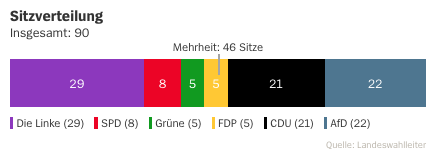And yet, he has led the AfD to become the second biggest party in today's state elections in Thuringia.
[Thread.]
1) One of the center-right parties, FDP or CDU, agrees to support a Prime Minister from the Left Party. Unthinkable until recently.
2) Both of the center-right parties support a government with the most extreme AfD leader. Still unthinkable.
They force all their opponents to form ideologically incoherent coalitions.
And then their old claim that these parties are all the same slowly start to seem true.
Since the founding of the party, it has always been embroiled in ferocious battles between relative "moderates" and extremists.
At each turn, the more extreme wing has won.
(Petry putched Lucke, Gauland putched Petry, etc.)
An AfD that's close to far-right extremists seems less viable than one that stirs resentment without flirting with fascism.
But the strong showing tonight shows that even a very extreme AfD can remain a big part of the party system.
And yet, Gauland, the AfD's leader, today claimed that Höcke represents the "center of the party."
Scary.
1) Very weak establishment parties.
2) Very strong fragmentation.
3) An increasingly extreme far-right party that in many ways sets the tone of the country's politics.
[The End.]












